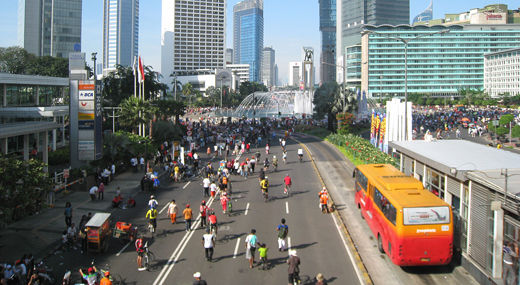
Way back in 1956, the first car free Sundays in the Netherlands and Belgium took place. Every Sunday from November 25, 1956 to January 20, 1957 was car free. Gradually and sporadically World Car Free Day started being celebrated around the world until the date of September 22nd was permanently chosen.
Car Free Day encourages motorists to give up their cars for a day. Organized events are held in some cities and countries. The event promotes improvement of mass transit, cycling and walking, and the development of communities where jobs are closer to home and shopping is within walking distance. The events, which vary by location, give motorists and commuters an idea of their locality with fewer cars.
The problem is that most people don’t take notice at all or take part for one day then revert back to their old ways.
Here is a challenge for your city, neighborhood or group: Spend one carefully prepared day without cars, study and observe closely what exactly goes on during that day, and reflect publicly and collectively on the lessons of this experience and on what might be prudently and creatively done next to build on these.
Or think about this as an exercise: Consider car users to be “addicts” who need to be “treated” in some way. Consider this to mean that motorists should have no choice but to be without cars, at least for a time. In this paradigm the proposed “treatment” is to find an answer to the following question in three main parts: Is it possible to get drivers out of their cars in one or more cities – in ways that will be tolerable in a pluralistic democracy – and for at least long enough to demonstrate what needs to happen to make a car-less (or more accurately, less-car) urban transport model actually work?
One of the ringleaders of the 1958 demonstration in New York City, urban critic Jane Jacobs, opened up the discussions of car restraint in cities in her book The Death and Life of Great American Cities. In 1981 the German Democratic Republic [East Germany] had its first Car Free Day.
We all know about the dangers of too much pollution to our environment, yet every day we get in our cars and make the situation worse. Car Free Days alone cannot change public policy concerning the need for mass transit, but the movement can make the public’s feelings known.
It is not just the pollution that can make traveling by car a misery. Hasn’t it sometimes struck you as absurd to be sitting in a grid-locked city traffic jam when you could be walking past the very traffic you’re stuck in? It might be nice to travel at your own pace and not have that set by other commuters.
Public transport also shortens your journey time by avoiding congested roads and taking more direct routes offered by infrastructure such as bus, railway and metro lines.
Car use is seen as the norm in modern society, but why should it be? Imagine a day when there is no traffic noise, everyone is car free and you can hear the birds sing and the trees rustle! Beyond the day-to-day journeying and pollution, cars blight our environment with discarded parts such as batteries and tires, oil leaks, and then eventually the carcass of the car when it is no longer fit for use.
So on this one day in September, could you take part in World Car Free Day and help make our world a little bit nicer to live in? You might even enjoy a change of scenery!
Adapted from www.cute-calendar.com, Wikipedia and other sources.
Photo: “Jakarta Car Free Day” by Gunawan Kartapranata – Own work. Licensed under CC BY-SA 3.0 via Commons.












Comments